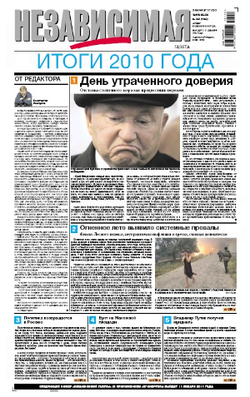Nezavisimaya Gazeta
You can help expand this article with text translated from the corresponding article in Russian. (February 2018) Click [show] for important translation instructions.
|
 Front page on 30 December 2010 | |
| Type | Daily newspaper |
|---|---|
| Format | A2 per spread |
| Owner(s) | Konstantin Remchukov |
| Editor | Konstantin Remchukov |
| Founded | 21 December 1990 |
| Headquarters | Moscow, Russia |
| Circulation | 40,000 |
| Website | www.ng.ru |
Nezavisimaya Gazeta (Russian: Независимая газета, IPA: [nʲɪzɐˈvʲisʲɪməjə ɡɐˈzʲetə], lit. 'Independent Newspaper') is a Russian daily newspaper.
History and profile
Nezavisimaya Gazeta was first published on 21 December 1990. It was one of the most important daily newspapers in the early post-Soviet period,[1] when it was seen as close to the opinion of the Moscow intelligentsia.[2] The paper was temporarily closed for four months in 1995.[3] Then it became part of the "Berezovsky Media Group".[3]
In 2007, following Berezovsky's political and economical disgrace, Nezavisimaya Gazeta was bought by Konstantin Remchukov, who became the new editor-in-chief, and his wife Yelena. Following the acquisition, the paper became mildly critical of the Putin administration. For example, it criticized the Kremlin's tightening control over the Central Election Commission and the Russian Academy of Science and in 2014 it was openly critical towards the annexation of Crimea by the Russia Federation.[4][5] Nevertheless, Nezavisimaya Gazeta is much more moderate towards the Russian government than radical opposition publications, such as Novaya Gazeta and Meduza.
Information ranging from a wide variety of sources, such as reporters, political scientists, historians, art historians, as well as critics is published in the newspaper. The newspaper also offers eight supplements and covers the issues of politics, society, culture and art.
References
- ^ Ivan Zasurskiĭ (2004). Media and Power in Post-Soviet Russia. M.E. Sharpe. p. 35. ISBN 978-0-7656-0863-5.
- ^ Clarke, Renfrey (31 October 1996). "Renfrey Clarke: "Russia Faces Financial Meltdown"". Johnson's Russia List Archive. Archived from the original on 31 October 1996. Retrieved 24 April 2017.
{{cite news}}: CS1 maint: bot: original URL status unknown (link) - ^ a b Laura Belin (2002). "The Russian Media in the 1990s". Journal of Communist Studies and Transition Politics. 18 (1): 139–160. doi:10.1080/13523270209696371. S2CID 153702113.
- ^ "'Nezavisimaya Gazeta' Is Worth Watching Again". RadioFreeEurope/RadioLiberty. Retrieved 2021-12-15.
- ^ "Ukraine crisis: Russians opposed to Putin". BBC News. 2014-03-12. Retrieved 2021-12-15.
External links
- Official website (in Russian)
 Media related to Nezavisimaya Gazeta at Wikimedia Commons
Media related to Nezavisimaya Gazeta at Wikimedia Commons
